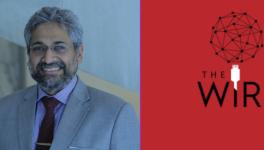Corporate Social Media in India: Sell Hate, Enjoy Profit
A few gave the appearance of being truly psychopathic individuals. The mass of others were ragged and illiterate peasants easily roused to hatred of the Tutsi. Perhaps the most sinister people I met were the educated political elite, men and women of charm and sophistication who spoke flawless French and who could engage in long philosophical debates about the nature of war and democracy. But they shared one thing in common with the soldiers and the peasants: they were drowning in the blood of their fellow countrymen.
Fergal Kane, a journalist with the BBC, wrote these chilling lines in his book, Season of Blood: A Rwandan Journey, winner of the Orwell prize in 1995. The organised and planned killing in Rwanda, one of the darkest episodes of the 20th century, resulted in the death of eight lakh Tutsi.
It is a strange coincidence that a year and a half before these unfortunate developments, the biggest democracy in the world went through its own cataclysmic moment, when Hindutva supremacist forces demolished a 500-year-old mosque after a long and bloody campaign. Even after the demolition large-scale communal riots broke out all over India, in which thousands died and whose scars are still difficult to heal.
There is at least one thing in common between what Rwanda went through and what India witnessed in 1992: both tragedies demonstrated how the media can prepare and provoke ordinary people into unleashing untold miseries on their neighbours.
Chroniclers of history have noted how the popular press, especially the radio channels, played a divisive, polarising role before the genocide in Rwanda. The infamous RTLM radio broadcasts called for weeding out “cockroaches” as they inflamed Hutu militants to target the Tutsi minority. “Aag musalsal zehan mein lagi hogi, yunhi koi aag me jala nahi hoga—there must have been a fire in the mind already, or else nobody would have been consumed by flames,” as a poet has said.
A large section of the print media, in the vernacular in particular, played a polarising, provocative role and pushed the majoritarian agenda with impunity in the late eighties and early nineties in India as well. The metamorphosis of a significant section of Hindi newspapers into Hindu newspapers is well known. This period was the first occasion of its kind in Independent India, when the news was weaponised on a mass scale. Perhaps the saving grace was that TV was largely under government control at the time, and there few private channels.
Times have changed, however. Today there is the internet, social media and it is clear that digital technology if used unethically can easily further dubious political agendas. It can be manipulated to promote autocracies and anti-people regimes. This is not just in India. For example, media analyst Alan MacLeod wrote about the use of new media technologies to “hijack democracy” during the 2017 elections in Kenya, whose result remains controversial. In Propaganda in the Information Age: Still Manufacturing Consent, published in 2019 by Routledge, which MacLeod edited, the media is said to have manufactured consent for the presidential election through fake news, spreading disinformation and government propaganda on online media platforms.
Advances in technology and easy access to the internet has made it possible even for every individual to bring a city or a region to a halt by making any mischievous piece of news “go viral”. This can result in arson, mayhem and violence... The possibility of exploiting media and digital tools to do harm requires that big data corporations be more diligent, especially when it comes to filtering hate speech.
It is a different matter that they have failed miserably.
Recall the Christchurch attack in New Zealand last year, in which some 50 died and another 50 were wounded. The alleged perpetrator, a White supremacist who spewed hatred of Muslim immigrants in an online manifesto streamed his killing spree live on Facebook. Facebook could do nothing about this toxic video going live.
Facebook was roasted after this incident but it is their profit-centric model and eagerness to be in the good books of establishments that has attracted more ire recently. They are accused of having no qualms in removing or blocking accounts of dissidents or deleting posts critical of the establishment, but turning a blind eye to right-wing posts, even if they are violent in nature and “controversial” enough to demand penal action.
Facebook’s latest India story corroborates the criticism it has received all over the world. Now accused of shielding right-wing leaders and their ideas in India, thanks to a recent expose by The Wall Street Journal, has rekindled the debate about weaponising news. New media might have arrived with a bang, but it is increasingly evident that they are conduits for vast amounts of fake news, violent speech and of spreading hate. And there are far too many instances of mega-corporations in the social media space prioritising their profit over democratic principles and free speech. Of course, the bias they are accused of also reflects their own world-view.
For instance, when the Black Lives Matter movement was at its peak, Facebook was widely condemned for carrying United States President Donald Trump’s statement: “When Looting Starts, Shooting Starts”, which was a provocation to violence. Twitter had, at the time, emphasised that his statement glorifies violence. Facebook’s compromise on race relations prompted more than 1,000 companies to boycott it in July.
Facebook’s world-view can also be gleaned from its position during the last German elections. A media company had aligned with Facebook to get extensive details of German voters and micro-target advertisements to specific voters to try and influence them to vote a certain way. Facebook had provided its own office in Berlin to this company. This project, which was run under guidance and advice from the United States, had supported Alternative für Deutschland, a neo-Fascist party. Details of this campaign are also to be found in the same book, edited by Alan MacLeod.
Facebook has around 300 million Indian subscribers, but finds itself on the defensive for violating its own hate speech rules and for promoting and supporting majoritarianism for pecuniary gain. Yet, broadly, the Wall Street Journal story has resulted in three important reactions: One, there has definitely been a churning within the Facebook organisation. Some employees of Facebook have questioned the company’s actions in India. Additionally, while Facebook India’s senior executive Ankhi Das had disallowed action against right-wing posts, employees in the India office had urged her to stick to company rules and take action. Second, the Congress party has written to Mark Zukerberg, the owner of Facebook, asking him to take action against those who violated company policy in India. And three, the Communist Party of India (Marxist), with the Congress, has demanded a Joint Parliamentary Committee (JPC) probe. The Delhi government, it is reported, also plans to summon the Facebook India chief to seek explanation.
It is possible that Facebook will be forced to rein in some right-wing elements in future, but would that be the end of this story? Definitely not. The right-wing elements are politically dominant at the moment and have acquired a wide social base, through which they are trying to acquire legitimacy for their world-view. It would seek other avenues to inject poison and toxicity in the social life from, even if Facebook closes the doors, even a little. It is doubtful that the right-wing propaganda can be contained by reining in one or two social media platforms—even if Facebook is extremely influential in India and has a wide user-base.
What this means is that nothing can beat firm and constant public awareness that helps citizens identify the real from the spurious. A degree of inertia seems to have overwhelmed a large section of even the politically literate fraternity in the country. The seductive charms of digital technology are hurting their person-to-person interactions, which are essential at the moment to build a counter-narrative to the right-wing propaganda. Was not it the Independence movement that taught us to take the road less travelled, even if we are alone on it.
The author is an independent journalist. The views are personal.
Get the latest reports & analysis with people's perspective on Protests, movements & deep analytical videos, discussions of the current affairs in your Telegram app. Subscribe to NewsClick's Telegram channel & get Real-Time updates on stories, as they get published on our website.
























